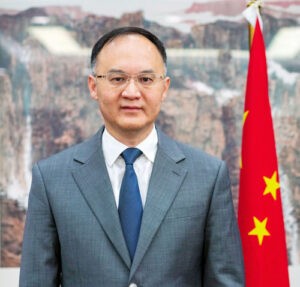
ISLAMABAD, Pakistan: Underlining the significance of China’s Belt and Road Initiative (BRI), the Chinese Ambassador to Pakistan Nong Rong has said that the multi-billion dollar highly ambitious project is envisioned to enhance global connectivity; rather than fueling confrontation or isolation.
“The BRI is not meant for geopolitics, nor for competition but for practical needs for development,” the Chinese envoy said in his recent article published by The Express Tribune and The Nation.
The envoy wrote that as the Chinese President Xi Jinping points out, the BRI aims to carry on the Silk Road spirit and co-build an open platform for cooperation to generate new driving forces for the development of all Countries.
Nong Rong wrote that China has committed itself to investing in the BRI Countries to meet their urgently needed projects i.e. infrastructure and energy projects under the China-Pakistan Economic Corridor (CPEC), guarantying the wellbeing of people and the functioning of the economy.
Spelling out the characteristics of the Belt and Road Initiative, the ambassador said that the BRI is not a slogan but an endeavour that yields tangible results and progress.
The Chinese ambassador wrote that over the past eight years, the BRI has evolved from vision into reality, and brought about enormous opportunities and benefits to Countries around the world.
The envoy said that trade between China and the BRI partners has exceeded US$ 9.2 trillion while the direct investment by Chinese Companies in Countries along the Belt and Road has surpassed US$ 130 billion. He also cited a World Bank report which suggested that when fully implemented, the BRI could increase global trade by 6.2 percent and global real income by 2.9 percent, and give a significant boost to global growth.
The Chinse ambassador stated that we have launched a large number of pragmatic cooperation projects to benefit the public, and established the multi-dimensional and comprehensive connectivity partnership.
To date, up to 140 partner Countries have signed documents on Belt and Road cooperation with China, he wrote.
“The BRI is beyond the scope of transportation connectivity, and has become the bridge for trade, commerce and people-to-people connectivity, thus serving as the world’s broadest-based and largest platform for international cooperation,” Nong Rong stated.
The envoy also highlighted that the BRI is world-oriented instead of driven by political blocs, saying that it follows the philosophy of openness, inclusiveness, and win-win cooperation, and sticks to the principle of extensive consultation, joint contribution and shared benefits.
Nong Rong said that the BRI sets its goal high that is for a better life, and sets its standard high that is for green development.
According to a World Bank study, the BRI could help lift 7.6 million people out of extreme poverty and 32 million people out of moderate poverty, he mentioned. The BRI could boost trade by 2.8 to 9.7 percent for the BRI Countries, and increase the global real income by 0.7 to 2.9 percent, he added.
Ambassador Nong Rong further wrote that the BRI is also striving to build a community of harmony between humanity and nature, and has launched a series of green action initiatives including green infrastructure construction, green energy, green transport and green finance.
“To create a just and reasonable global environmental governance system through eco-environmental cooperation, now becomes the feature of the BRI,” he said.
Shedding lights on dividends of CPEC, the envoy said that with joints efforts by China and Pakistan, 46 CPEC projects have been completed or under construction with a total investment of US$ 25.4 billion, and bring about 75,000 job opportunities at its peak.
The envoy emphasized that China and Pakistan should enhance cooperation in promoting high-quality development of CPEC, and give more focus to industry, agriculture, and ICT sectors so as to enhance export competitiveness, increase export and tax revenues, and achieve sustainable development with better production capacity.
The Chinse ambassador said that we should also jointly put forth the Initiative for Belt and Road Partnership on Green Development to inject a new impetus into building the green CPEC, and step up cooperation in areas like green infrastructure, green energy, and green finance, and set a new pilot for high-quality development under the BRI framework.
